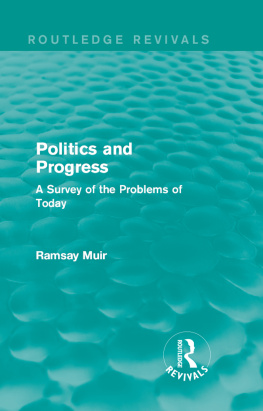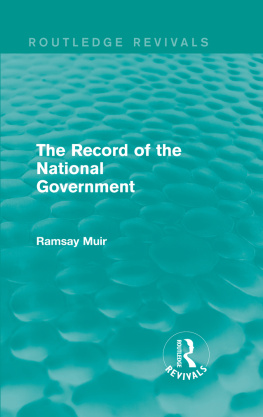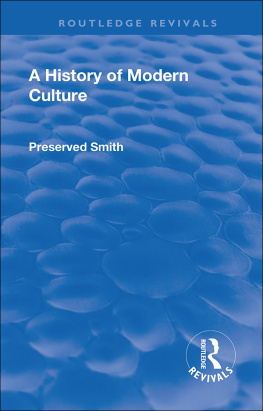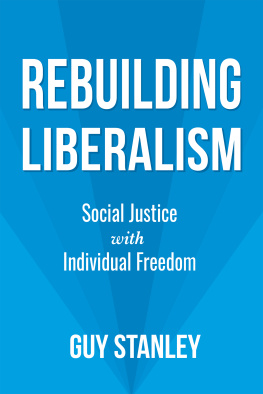Routledge Revivals
Politics and Progress
In Politics and Progress, Muir aims to outline the political and social aims of liberalism and how it differs from conservatism and socialism as well as philosophising what a truly liberal society would look like. Originally published in 1923, this study details the political situation as it stood then, the past achievements of liberalism and what immediate problems society is facing that need to solved. This title will be of interest to students of politics.
Politics and Progress
A Survey of the Problems of Today
Ramsay Muir
First published in 1923
by Methuen & Co. Ltd
This edition first published in 2016 by Routledge
2 Park Square, Milton Park, Abingdon, Oxon, OX14 4RN
and by Routledge
711 Third Avenue, New York, NY 10017
Routledge is an imprint of the Taylor & Francis Group, an informa business
1923 Ramsay Muir
All rights reserved. No part of this book may be reprinted or reproduced or utilised in any form or by any electronic, mechanical, or other means, now known or hereafter invented, including photocopying and recording, or in any information storage or retrieval system, without permission in writing from the publishers.
Publishers Note
The publisher has gone to great lengths to ensure the quality of this reprint but points out that some imperfections in the original copies may be apparent.
Disclaimer
The publisher has made every effort to trace copyright holders and welcomes correspondence from those they have been unable to contact.
A Library of Congress record exists under LC control number: 23011402
ISBN 13: 978-1-138-64156-3 (hbk)
ISBN 13: 978-1-315-63040-3 (ebk)
POLITICS AND PROGRESS
A SURVEY OF THE PROBLEMS OF TO-DAY
BY
RAMSAY MUIR
First Published in 1923
PRINTED IN GREAT BRITAIN
TO
MY FRIENDS IN ROCHDALE
PREFACE
T HE purpose of this little book is to give a coherent view of the political and social aims of Liberalism; to show that it represents a distinctive attitude, sharply contrasted with that of Conservatism and with that of Socialism; to analyse the reasons for the Liberals dissatisfaction with the existing order of things; to describe the kind of society which he would desire to create, and the immediate steps towards this goal which he would advocate; and to show that these aims are in accord with the traditions and the great achievements of British Liberalism.
More than two years ago, after profitable discussions with a group of Manchester friends, I wrote a little book called Liberalism and Industry. In a modest way I believe that it helped to stimulate an active discussion among the younger Liberals, which has gone forward without interruption during these two years. From this discussion I have learnt much; and in the present volume some of the conclusions which I tentatively put forward in the earlier book have been considerably modified. But this book is not meant in any sense as a new edition of Liberalism and Industry. Most of the subjects dealt with in that book, and especially in its first half, are here dealt with very lightly, or not at all; and the ground covered by this volume is much wider than the ground covered by its predecessor.
Nor is this little book to be regarded in any sense as a pronouncement on behalf of a group or clique within the Liberal party. I am proud to be associated with a body of men who have been giving much of their time and thought to the co-operative discussion of some of the most difficult of political problems. But their aim has throughout been primarily investigative and educative. They repudiate the suggestion that they form a clique or school within the Liberal party. And, in any case, what I have here written, though it has been deeply influenced by what I have learnt in these discussions, is issued solely on my own responsibility.
RAMSAY MUIR
CONTENTS
POLITICS AND PROGRESS
T HE General Election of 1922 will probably be regarded, by future historians, as marking the definite beginning of a new era in British politics.
Throughout the century of strenuous political activity which preceded the Great War, both Parliament and the country were broadly divided between two great political forcesa party of Conservation and a party of Progress. In the party of Progress there were alwaysas was naturalvarious and even conflicting elements. But on the whole they held together, and combined to maintain successive ministries in power. Even when a distinct Labour party was organized in 1900, it was content for a number of years to act as a wing of the Liberal party, which could count upon its steady support during the sharp conflicts of 19101914. The division of the political forces of the country into two main armies was so well established that it seemed to be almost part of the order of Nature. Our whole machinery of government took it for granted, and seemed to be workable only on the assumption that this division continued. The very arrangement of the seats in the House of Commons implied it.
But the Great War, which has changed so many things, brought to an end this traditional alignment of political forces. During the war community of purpose almost obliterated party distinctions. After the war a large section of the Liberal party joined with the Conservatives to continue the device of Coalition Government, which had been adopted for war purposes; and used all the prestige of victory, and all the devices of electioneering, to destroy that section of the Liberal party which strove to maintain its independent existence Ruling for four years with an overwhelming majority in Parliament, the Coalition drove into the minds of a great part of the electorate, and especially into the minds of the younger voters whose political memory did not extend beyond the war, a belief that there was no fundamental difference between Liberalism and Conservatism. The small remnant of Liberals who stood aloof from the Coalition did little to weaken this belief. Their numbers in Parliament were insignificant, and wholly disproportionate to the support which they could count upon in the country. They were bereft of most of their leaders, and had few spokesmen who could command the ear of the country. They devoted themselves rather to criticism of the Government than to the promulgation of an inspiring policy of constructive reform; and even the criticism of so small a body was not very effective. It seemed that the once powerful Liberal party had sunk to impotence, and was on the verge of annihilation.
The young Labour party, which, having never faced the difficult task of government, was not handicapped by any record of imperfect achievement, naturally drew immense advantage from these circumstances. It had obtained control, for political purposes, of the powerful organization of trade unions and co-operative societies. It drew into its ranks multitudes of the younger and more progressive Liberals, who had lost patience with the policy of mere negation and criticism to which the shattered Liberal party seemed to be committed. It could appeal to all that vague yearning for a new heaven and a new earth, which inspired many men after the horrors of the war. It had a vision of a wholly new ordera vague and ill-thought-out vision, but still a vision; and it could promulgate large promises all the more easily because its leaders had little experience of the difficulties of practical politics, and because there was no immediate prospect of their being called upon to translate their promises into facts.












